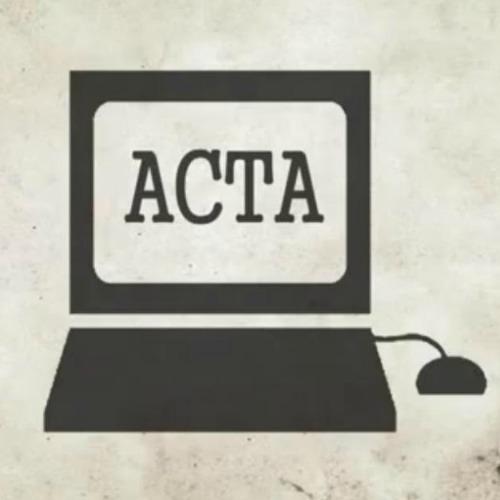BROOKE GLADSTONE: Over the past two years, a global pact meant to curb online piracy and the trade of counterfeit goods called the Anti-Counterfeiting Trade Agreement, or ACTA, has been negotiated in secret. Now we know the penalties considered for even minor violations were severe, including the seizure of websites, policing by Internet service providers and even banishment from the Net, if accused three times of illegal downloading, even if the charges aren’t proved. Meanwhile, copycat bills such as the Senate’s Stop Online Piracy Act, or SOPA, and its House counterpart, PIPA, were introduced and then killed after public uproar. Now it seems ACTA may be breathing its last. While 9 countries and 22 EU member states have signed on, none have yet ratified it. And last month the EU parliament soundly rejected it.
We asked Harvard Law Professor Jonathan Zittrain if ACTA is dead, and he said, “Well, like Frankenstein’s monster is dead.”
JONATHAN ZITTRAIN: [LAUGHS] Somewhere between dead and undead, with various constituent parts of it able to be sewn on to other creatures. We had Mexico in 2010, the senate there, unanimously voted to remove itself from the ACTA negotiations. And then you end up with, just this month, the Mexican Institute for the Industrial Property announced that Mexico had signed ACTA in Tokyo through its ambassador.
Now, that’s something that still would have to be ratified, but it’s very interesting to see these sort of internal disagreements, like the European Parliament versus the European Commission, the Mexican Senate versus the Mexican Institute. There’s not even unanimity within governments about what to do about this.
BROOKE GLADSTONE: And do we have to ratify it here, or do we just enact it piece by piece, while nobody’s looking?
JONATHAN ZITTRAIN: [LAUGHS] That may well be a strategy. There are people looking, and we saw this month the announcement of something called the Internet Defense League, which has its own cat signal. A cute cat is projected into the sky, [BROOKE LAUGHS] trying to summon the masses of the Internet. I think they did it on the Bay Bridge in San Francisco, to start.
[BROOKE LAUGHS]
They’ll keep an eye out and then try to summon the masses when there’s a problem. And, of course, you can get fatigued, you can get exhausted again and again, trying to beat this back in every form.
BROOKE GLADSTONE: You have SOPA and PIPA and ACTA and TPP and CETA. This is the Comprehensive Economic and Trade Agreement that is being hammered out between EU and Canada. Isn’t that the latest?
JONATHAN ZITTRAIN: Yes. And from as much as we can tell – again, this is all through leaked texts – the CETA, which is nearing completion, had been pulling back on some of its similarities to ACTA. So it’s removing a hand here and a foot there. But again, we don’t know what’s in it, until it suddenly is dropped upon everybody for ratification. But this is just no way to make the sausage.
BROOKE GLADSTONE: [LAUGHS] What do you think is worse, the provisions within these treaties or the way that they’re being hammered out?
JONATHAN ZITTRAIN: The law professor in me says it’s the process foul.
BROOKE GLADSTONE: Mm-hmm.
JONATHAN ZITTRAIN: It’s the attempt to do this without the best disinfectant, which is sunshine. And if there is the sunshine and you have a process that’s more open, you really will have geeks who are keeping an eye on things. They’ll raise the alarm if they see something that worries them. There’ll be a discussion about it. We’ll see if people are rallied about it. And that’s how you do things in a democracy.
BROOKE GLADSTONE: Are you readying a cat signal in Boston?
JONATHAN ZITTRAIN: [LAUGHS] I am scanning the skies, waiting to see if the call goes out, yes.
BROOKE GLADSTONE: Jonathan, thank you very much.
JONATHAN ZITTRAIN: Thank you so much, Brooke.
BROOKE GLADSTONE: Jonathan Zittrain is a professor at Harvard Law School and at the School of Engineering and Applied Sciences.
